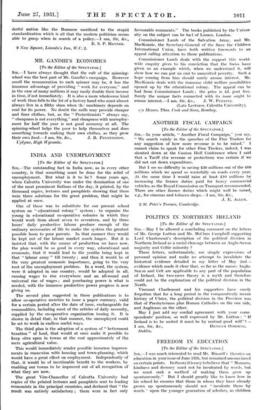INDIA AND UNEMPLOYMENT
[To the Editor of the SPECTATOR.]
outstanding fact in India now, as in every other country, is that something must be done for the relief of unemployment. But what is it to be ? Some years ago, When Calcutta University was under the domination of one of the most prominent Indians of the day, it printed, by the thousand copies, lectures and pamphlets showing that there were three solutions for the great problem, that might be applied- at once.
One of these was to substitute for our present school system an " educational colony " system : to organize the young •in educational co-operative colonies in which they would work from about seven to seventeen, and by three hOUrs' daily productive labour produce enough of the ordinary necessaries of life to make the system the greatest possible boon to poor parents. In that manner they would be kept out .of the labour market much longer. But it is insisted that, with the means of production we have now, the plan would be so good in every way, educational and economic, that it would lead to the youths being kept in that " labour army " till twenty ; and then it would be of the very greatest economic importance, going to the very root of the unemployment problem. In a word, the system, were it adopted in one country, would be adopted in all, causing wages to rise everywhere and an all-round and universal rise of wages ; and purchasing power is what is needed, with the immense productive power progress is now giving us.
The second plan suggested in those publications is to allow co-operative societies to issue a paper currency, valid for a certain period after the date of issue, exchangeable for commodities, including most of the articles of daily necessity, supplied by the co-operative organization issuing it. It is shown in detail that, in that manner, the unemployed could be set to work in endless useful ways.
The third plan is the adoption of a system of " betterment taxation " of land, that would at once make it possible to keep sites open in towns at the cost approximately of the mere agricultural value.
This would immediately render possible immense improve- ments in connexion with housing and town-planning, which would have a great effect on employment. Independently of that, it would be of inestimable benefit to the workers, by enabling our towns to be improved out of all recognition of what they are now, The great Vice-Chancellor of Calcutta University had copies of the printed lectures and pamphlets sent to leading economists in the principal countries, and declared that " the result was entirely satisfactory ; there were in fact only favourable comments." The books published by the Univer- sity on the subject can be had of Luzacs, London.
Commissioner Lamb of the Salvation Army, and Mr. MacKenzie, the Secretary-General of the Save the Children International Union, have both written forewords to an appeal calling attention to those publications.
Commissioner Lamb deals with the support this world- wide enquiry gives to his conviction that the Swiss have given us an example which, when we understand it, will show how we can put an end to unmerited poverty. Such a hope coming from him should surely arouse interest. Mr. MacKenzie deals with the immense child welfare possibilities opened up by the educational colony. The appeal can be had from Commissioner Lamb ; the price is 4d. post free. Surely the unique facts connected with its issue ought to arouse interest.—I am, Sir, &c., J. W. PETAVEL (Late Lecturer, Calcutta University). c/o Messrs. Thos. Cook and Sons, Bombay.






































 Previous page
Previous page